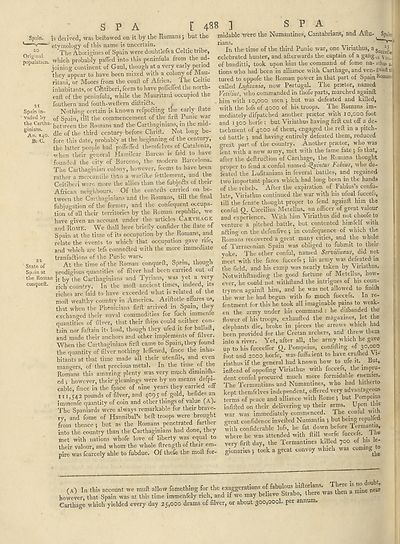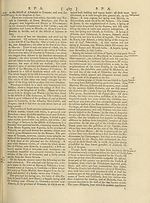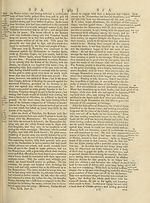Encyclopaedia Britannica, or, a Dictionary of arts, sciences, and miscellaneous literature : enlarged and improved. Illustrated with nearly six hundred engravings > Volume 19, Scripture-SUG
(536) Page 488
Download files
Complete book:
Individual page:
Thumbnail gallery: Grid view | List view

SPA [ 488 ] s p A 1.1
Spain, is derived, was bellowed on it by the Romans; but the midable were the Numantmes, Cantabrians, and Aftu- Jp*
etymology of this name is uncertain.
20 The Aborigines of Spain were doubtlefs a Celtic tribe,
population, which probably paffed into this peninfula from the ad¬
joining continent of Gaul, though at a very early period
they appear to have been mixed with a colony of IVIau-
ritani, or Moors from the coall of Africa. ^ I he Celtic
inhabitants, or Cf?itiberi, feem to have pofleiled the nor th-
eaft of the peninfula, while the Mauritani occupied the
21 fouthern and fouth-weftern diltridls.^
Spain in- Nothing certain is known refpedling tne early Hate
Varied by Qf Spain, till the commencement of the nrft Punic war
theCartha- between the Homans and the Carthaginians, in the mid-
£An.n*-o. die of the third century before Chrift. Not long be-
B; C. fore this date, probably at the beginning of the century,
the latter people bad poffeflfed themfelves of Catalonia,
when their general Hamilcar Barcas is faid to have
founded the city of Barceno, the modern Barcelona.
The Carthaginian colony, however, feems to have been
rather a mercantile than a warlike fettlement, and the
Celtiberi were more the allies than the fubjeCiS of their
African neighbours. Of the contefts carried on be¬
tween the Carthaginians and the Romans, till the final
fubjugation of the former, and the confequent occupa¬
tion of all their territories by the Roman republic, we
have given an account under the articles Carthage
and Rome. We (hall here briefly confider the Hate of
Spain at the time of its occupation by the Romans, and
relate the events to which that occupation gave rife,
and 'which are lefs connedled with the more immediate
tranfadlions of the Punic wars.
State of At the time of the Roman conqueft, Spain, though
Spain at prodigious quantities of filver had been carried out of
the Roman R by the Carthaginians and Tyrians, was yet a very
conqueft. country> xn the moft ancient times, indeed, its
riches are faid to have exceeded what is related of the
mod; wealthy country in America. Ariftotle affures us,
that when tire Phenicians firfl: arrived in Spain, they
exchanged their naval commodities for fuch immenfe
quantities of filver, that their (hips could neither con¬
tain nor fuftain its load, though they ufed it for ballaft,
and made their anchors and other implements of filver.
When the Carthaginians firft came to Spain, they found
the quantity of filver nothing leflened, fince the inha¬
bitants at that time made all their utenfils, and even
mangers, of that precious metal. In the time of the
Romans this amazing plenty wras very much diminifh-
ed ; however, their gleanings were by no means defpi-
cable, fince in the fpace of nine years they carried off
111,542 pounds of filver, and 4095 of gold, befides an
immenfe quantity of coin and other things of value (a).
The Spaniards were always remarkable for their brave¬
ry, and fome of Hannibal’s bed troops were brought
from thence j but as the Romans penetrated farther
into the country than the Carthaginians had done, they
met with nations whofe love of liberty was equal to
their valour, and whom the whole ftrength of their em¬
pire was fcarcely able to fubdue. Of thefe the moil for-
nans.
In the time of the third Punic war, one Viriathus, a Succ^r
celebrated hunter, and afterwards the captain of a gang01 Vlr®
of banditti, took upon him the command of fome na- athus a.
tions who had been in alliance with Carthage, and ven-gainfttii
tured to oppofe the Roman power in that part of Spain Ionian-
called Lufitania, now Portugal. The praetor, named
VetiHus, who commanded in fhofe parts, marched againft
him with 10,000 men j but was defeated and killed,
with the lofs of 4000 of his troops. The Romans im¬
mediately difpatehed another praetor with 10,000 foot
and 1300 horfe : but Viriathus having firft cut off a de¬
tachment of 4000 of them, engaged the reft in a pitch¬
ed battle •, and having entirely defeated them, reduced
great part of the country. A-nother praetor, who was
fent with a new army, met with the lame fate} fo that,
after the deftrudion of Carthage, the Romans thought
proper to fend a conful named Quintus tabius^ who de¬
feated the Lufitanians in feverai battles, and regained
two important places which had long been in the hands
of the rebels. After the expiration of Fabius’s confu-
late, Viriathus continued the war with his ufual fuccefs,
till the fenate thought proper to fend againft him the
conful Q. Csecilius Metellus, an officer of great valour*
and experience. With him Viriathus did not choofe to
venture a pitched battle, but contented himfelf with
ading on the defenfive j in confequence of which the
Romans recovered a great many cities, and the whole
of Tarraconian Spain was obliged to fubmit to their
yoke. The other conful, named Servilianus, did not
meet with the fame fuccefs 5 his army was defeated in
the field, and his camp was nearly taken by Viriathus.
Notwithftanding the good fortune of Metellus, how¬
ever, he could not withftand the intrigues of his coun¬
trymen againft him, and he was not allowed to finrfh
the war he had begun with fo much fuccefs. In re-
fentment for this he took all imaginable pains to weak¬
en the army under his command : he dilbanded the
flower of his troops, exhaufted the magazines, let the
elephants die, broke in pieces the arrows which had
been provided for the Cretan archers, and threw them
into a river. Yet, after all, the army which he gave
up to his fucceffor Q. Pompeius, conlifting of 30,000
foot and 2000 horfe, was fuffieient to have cruffied vi¬
riathus if the general had known how to ufe it.. But,
inftead of oppofing Viriathus with fuccefs, the impru¬
dent conful procured much more formidable enemies.
The Termantians and Numantines, who had hitherto
kept themfelves independent, offered very advantageous
terms of peace and alliance with Rome *, but Pompeius
infilled on their delivering up their arms. Upon this
war was immediately commenced. The conlul with
great confidence invefted Numantia *, but being repulfed
with confiderable lofs, he fat down before Termantia,
where he was attended with ftill worfe fuccefs. 1®
very firft day, the Termantines killed 700 of ms le¬
gionaries } took a great convoy which was coming^o
(a) In this account we muft allow fomething for the exaggerations of fabulous hiftorians^ us nod
however, that Spain was at this time immenfely rich, and if we may believe Strabo, there was then
Carthage which yielded every day 25,000 drams of filver, or about 300,000!. per annum.
Spain, is derived, was bellowed on it by the Romans; but the midable were the Numantmes, Cantabrians, and Aftu- Jp*
etymology of this name is uncertain.
20 The Aborigines of Spain were doubtlefs a Celtic tribe,
population, which probably paffed into this peninfula from the ad¬
joining continent of Gaul, though at a very early period
they appear to have been mixed with a colony of IVIau-
ritani, or Moors from the coall of Africa. ^ I he Celtic
inhabitants, or Cf?itiberi, feem to have pofleiled the nor th-
eaft of the peninfula, while the Mauritani occupied the
21 fouthern and fouth-weftern diltridls.^
Spain in- Nothing certain is known refpedling tne early Hate
Varied by Qf Spain, till the commencement of the nrft Punic war
theCartha- between the Homans and the Carthaginians, in the mid-
£An.n*-o. die of the third century before Chrift. Not long be-
B; C. fore this date, probably at the beginning of the century,
the latter people bad poffeflfed themfelves of Catalonia,
when their general Hamilcar Barcas is faid to have
founded the city of Barceno, the modern Barcelona.
The Carthaginian colony, however, feems to have been
rather a mercantile than a warlike fettlement, and the
Celtiberi were more the allies than the fubjeCiS of their
African neighbours. Of the contefts carried on be¬
tween the Carthaginians and the Romans, till the final
fubjugation of the former, and the confequent occupa¬
tion of all their territories by the Roman republic, we
have given an account under the articles Carthage
and Rome. We (hall here briefly confider the Hate of
Spain at the time of its occupation by the Romans, and
relate the events to which that occupation gave rife,
and 'which are lefs connedled with the more immediate
tranfadlions of the Punic wars.
State of At the time of the Roman conqueft, Spain, though
Spain at prodigious quantities of filver had been carried out of
the Roman R by the Carthaginians and Tyrians, was yet a very
conqueft. country> xn the moft ancient times, indeed, its
riches are faid to have exceeded what is related of the
mod; wealthy country in America. Ariftotle affures us,
that when tire Phenicians firfl: arrived in Spain, they
exchanged their naval commodities for fuch immenfe
quantities of filver, that their (hips could neither con¬
tain nor fuftain its load, though they ufed it for ballaft,
and made their anchors and other implements of filver.
When the Carthaginians firft came to Spain, they found
the quantity of filver nothing leflened, fince the inha¬
bitants at that time made all their utenfils, and even
mangers, of that precious metal. In the time of the
Romans this amazing plenty wras very much diminifh-
ed ; however, their gleanings were by no means defpi-
cable, fince in the fpace of nine years they carried off
111,542 pounds of filver, and 4095 of gold, befides an
immenfe quantity of coin and other things of value (a).
The Spaniards were always remarkable for their brave¬
ry, and fome of Hannibal’s bed troops were brought
from thence j but as the Romans penetrated farther
into the country than the Carthaginians had done, they
met with nations whofe love of liberty was equal to
their valour, and whom the whole ftrength of their em¬
pire was fcarcely able to fubdue. Of thefe the moil for-
nans.
In the time of the third Punic war, one Viriathus, a Succ^r
celebrated hunter, and afterwards the captain of a gang01 Vlr®
of banditti, took upon him the command of fome na- athus a.
tions who had been in alliance with Carthage, and ven-gainfttii
tured to oppofe the Roman power in that part of Spain Ionian-
called Lufitania, now Portugal. The praetor, named
VetiHus, who commanded in fhofe parts, marched againft
him with 10,000 men j but was defeated and killed,
with the lofs of 4000 of his troops. The Romans im¬
mediately difpatehed another praetor with 10,000 foot
and 1300 horfe : but Viriathus having firft cut off a de¬
tachment of 4000 of them, engaged the reft in a pitch¬
ed battle •, and having entirely defeated them, reduced
great part of the country. A-nother praetor, who was
fent with a new army, met with the lame fate} fo that,
after the deftrudion of Carthage, the Romans thought
proper to fend a conful named Quintus tabius^ who de¬
feated the Lufitanians in feverai battles, and regained
two important places which had long been in the hands
of the rebels. After the expiration of Fabius’s confu-
late, Viriathus continued the war with his ufual fuccefs,
till the fenate thought proper to fend againft him the
conful Q. Csecilius Metellus, an officer of great valour*
and experience. With him Viriathus did not choofe to
venture a pitched battle, but contented himfelf with
ading on the defenfive j in confequence of which the
Romans recovered a great many cities, and the whole
of Tarraconian Spain was obliged to fubmit to their
yoke. The other conful, named Servilianus, did not
meet with the fame fuccefs 5 his army was defeated in
the field, and his camp was nearly taken by Viriathus.
Notwithftanding the good fortune of Metellus, how¬
ever, he could not withftand the intrigues of his coun¬
trymen againft him, and he was not allowed to finrfh
the war he had begun with fo much fuccefs. In re-
fentment for this he took all imaginable pains to weak¬
en the army under his command : he dilbanded the
flower of his troops, exhaufted the magazines, let the
elephants die, broke in pieces the arrows which had
been provided for the Cretan archers, and threw them
into a river. Yet, after all, the army which he gave
up to his fucceffor Q. Pompeius, conlifting of 30,000
foot and 2000 horfe, was fuffieient to have cruffied vi¬
riathus if the general had known how to ufe it.. But,
inftead of oppofing Viriathus with fuccefs, the impru¬
dent conful procured much more formidable enemies.
The Termantians and Numantines, who had hitherto
kept themfelves independent, offered very advantageous
terms of peace and alliance with Rome *, but Pompeius
infilled on their delivering up their arms. Upon this
war was immediately commenced. The conlul with
great confidence invefted Numantia *, but being repulfed
with confiderable lofs, he fat down before Termantia,
where he was attended with ftill worfe fuccefs. 1®
very firft day, the Termantines killed 700 of ms le¬
gionaries } took a great convoy which was coming^o
(a) In this account we muft allow fomething for the exaggerations of fabulous hiftorians^ us nod
however, that Spain was at this time immenfely rich, and if we may believe Strabo, there was then
Carthage which yielded every day 25,000 drams of filver, or about 300,000!. per annum.
Set display mode to:
![]() Universal Viewer |
Universal Viewer | ![]() Mirador |
Large image | Transcription
Mirador |
Large image | Transcription
Images and transcriptions on this page, including medium image downloads, may be used under the Creative Commons Attribution 4.0 International Licence unless otherwise stated. ![]()
| Permanent URL | https://digital.nls.uk/192702250 |
|---|
| Attribution and copyright: |
|
|---|
| Description | Ten editions of 'Encyclopaedia Britannica', issued from 1768-1903, in 231 volumes. Originally issued in 100 weekly parts (3 volumes) between 1768 and 1771 by publishers: Colin Macfarquhar and Andrew Bell (Edinburgh); editor: William Smellie: engraver: Andrew Bell. Expanded editions in the 19th century featured more volumes and contributions from leading experts in their fields. Managed and published in Edinburgh up to the 9th edition (25 volumes, from 1875-1889); the 10th edition (1902-1903) re-issued the 9th edition, with 11 supplementary volumes. |
|---|---|
| Additional NLS resources: |
|

